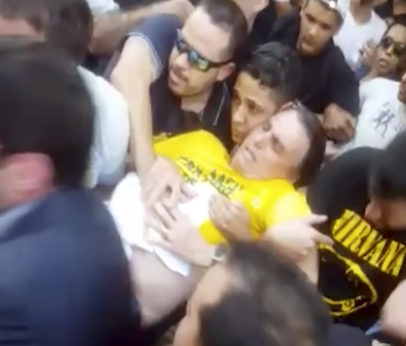
With less than a month to go until the October 7 national elections, the political situation in Brazil remains extremely unsettled. The jailing of the most popular candidate of the left has been followed by the serious wounding of the most popular candidate on the right, and now there are not-so-veiled threats of a military coup.
Polls have shown that, by far, the most popular of the declared candidates for president would have been former President Luiz Inácio Lula da Silva of the Workers’ Party (Partido dos Trabalhadores). His two terms in the presidency, from 2003 to 2011, saw the greatest improvements ever in the living standards and rights of the Brazilian working class and poor. But since April, he has been sitting in jail as what many see as a bogus corruption case against him goes through the appeals process.
Lula and his supporters were hoping that the Supreme Court would rule that, while there was still a possibility of a successful appeal, Lula’s name could stay on the ballot for October. But this has not worked out, so on Tuesday, September 11, Lula himself bowed out. He indicated that his vice presidential candidate, former São Paolo Mayor Fernando Haddad, be the new presidential candidate for the Workers’ Party, with former Communist Party of Brazil Congresswoman Manuela d’Avila as the new vice presidential candidate.
Will Lula’s popularity transfer to the Haddad-d’Avila ticket? Haddad does not appear, up to now, to be well known outside his home city and region. How much can he advance in support by the October 7 election? Can he at least get into the runoff, which will be held on October 28?
Haddad is not the only left-of-center candidate in the race. Perhaps another person, such as Ciro Gomes of the Democratic Labor Party (Partido Democratico Trabalhista), a former cabinet member and state governor, could get into the runoff? Brazilians are paying avid attention to the “intention to vote” polls.
What has been certain so far is that the second most popular candidate of the many who are running is Jair Bolsonaro of the Social Liberal Party (Partido Social Liberal). Bolsonaro, a former army officer and current congressman, is widely considered to be a dangerous right-wing extremist. He has praised the right-wing military dictatorship which ruled Brazil with a heavy hand from 1964 to 1985 and has broadly hinted that a return to some of its repressive practices would be good. He is famous for his misogynistic, homophobic, and racist statements.
But he can claim to be the new broom that sweeps clean, in part because he has not, like a great many of Brazil’s right-wing politicians, been convicted of corruption. He has been rising in the polls and now stands at 24 percent among those with an “intention to vote.” His vice presidential candidate, Antonio Hamilton Martins Mourão, an army general, is even more ferociously reactionary. His rhetoric has gotten him some mass support, according to the polls.
But there is never a dull moment in Brazilian politics. On September 6, in the middle of a campaign rally in Juiz de Fora, in Minas Gerais state in the southeast of the country, Bolsonaro was stabbed in the abdomen by a man who said he was on a “mission from God.” At first, the wounds appeared to be life-threatening, but Bolsonaro is reported to be recovering. Nevertheless, it is unlikely that he will be able to campaign for the October 7 vote.

Immediately, there were attempts to pin the assassination attempt on the left, and specifically on the Workers’ Party, in spite of the fact that the Workers’ Party, like everybody else, immediately and firmly denounced the attack. Bolsonaro’s vice presidential running mate, General Mourão, explicitly blamed the Workers’ Party, in spite of the fact that there is no evidence the assailant had any affiliation with it or was even politically motivated. Mourão went even further; he said that if the Workers’ Party wanted to turn to violence, they should remember that the Brazilian military are “professionals of violence.”
This wild statement by the general jibed with some other military-related news that has been discussed in Brazil. Jair Bolsonaro’s two sons, who have political careers of their own, have been having meetings with army generals. And the head of the Brazilian army, General Eduardo Villas Bôas, has jangled nerves by his own statements. First, he denounced a United Nations declaration in favor of allowing Lula to run for president, and then, after the stabbing of Bolsonaro, the general suggested that if, after the attack Bolsonaro were to lose the election, this might be attributed to the incident.
The idea that Bolsonaro would get a huge sympathy vote because of the stabbing appears to be wrong. In the most recent polls, he just got a little lift, from 22 to 24 percent of the intention to vote. This is probably related to the fact that he has the largest disapproval rating of all the presidential candidates, 44 percent.
On the other side of the political divide, the question has been whether or not Haddad can bring up his low polling numbers on the basis of being the preferred candidate, and continuer of the legacy, of the much-loved Lula. There are indeed indications that Haddad’s numbers are now rising, as are those of Ciro Gomes. Both of Brazil’s major polling institutions, Datafolha and Ibope, show this, with different specific statistics. Furthermore, polls indicate that although Bolsonaro would certainly get into a probable October 28 runoff, he would then lose to all other probable candidates except possibly Haddad, with whom he would be in a statistical tie.
The idea that a leftist candidate might return Brazil to the pro-working class policies of Lula and his immediate successor from the Workers’ Party, Dilma Rousseff, caused wailing and gnashing of teeth on the Brazilian stock market.










